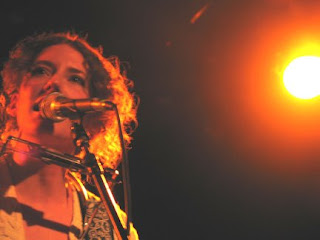
 For any one who thinks that Kathleen Edwards is just a nice little country singer from Canada, I say go see her in concert. Last night I caught her show at the Paradise Rock Club in Boston and, let me tell you, she and her band rock. Edwards is an absolute dynamo, moving around the stage beating on her beaten acoustic and even playing some stellar electric leads. She also has an amazing band, which features her husband Colin Cripps on lead guitar and Jim Bryson on keys and lead guitar. Both dudes can play! The band looks like it's having a blast as Kathleen smiles and swears the whole way through. They played for a better part of two hours playing songs mostly from "Back to Me" and "Asking for Flowers," her new album. She rocked out on the new uptempo tunes "The Cheapest Key" and "I Make the Dough, You Get the Glory."
For any one who thinks that Kathleen Edwards is just a nice little country singer from Canada, I say go see her in concert. Last night I caught her show at the Paradise Rock Club in Boston and, let me tell you, she and her band rock. Edwards is an absolute dynamo, moving around the stage beating on her beaten acoustic and even playing some stellar electric leads. She also has an amazing band, which features her husband Colin Cripps on lead guitar and Jim Bryson on keys and lead guitar. Both dudes can play! The band looks like it's having a blast as Kathleen smiles and swears the whole way through. They played for a better part of two hours playing songs mostly from "Back to Me" and "Asking for Flowers," her new album. She rocked out on the new uptempo tunes "The Cheapest Key" and "I Make the Dough, You Get the Glory."  Before the latter song, she jubilantly told the us that she had heard earlier in the day from hockey thug Marty McSorley, who she namechecks in the tune, and that he agreed to be in her video and may even bring along The Great One, Wayne Gretzky, to join in. Being from Canada, she's an avid hockey fan and asked the crowd if there were any Bruins fans out there. When a big cheer went up, she brought out a box and offered up gingerbread man cookies dressed in Ottawa Senators uniforms. She and the band finished up with a pair of encores, first her alone playing what looked like an electric mandolin on new song "Sure as Shit" and then the whole band returned, blowing out "Back to Me" for the finale. A great night.
Before the latter song, she jubilantly told the us that she had heard earlier in the day from hockey thug Marty McSorley, who she namechecks in the tune, and that he agreed to be in her video and may even bring along The Great One, Wayne Gretzky, to join in. Being from Canada, she's an avid hockey fan and asked the crowd if there were any Bruins fans out there. When a big cheer went up, she brought out a box and offered up gingerbread man cookies dressed in Ottawa Senators uniforms. She and the band finished up with a pair of encores, first her alone playing what looked like an electric mandolin on new song "Sure as Shit" and then the whole band returned, blowing out "Back to Me" for the finale. A great night.A couple of videos below. For more pics, click HERE.












